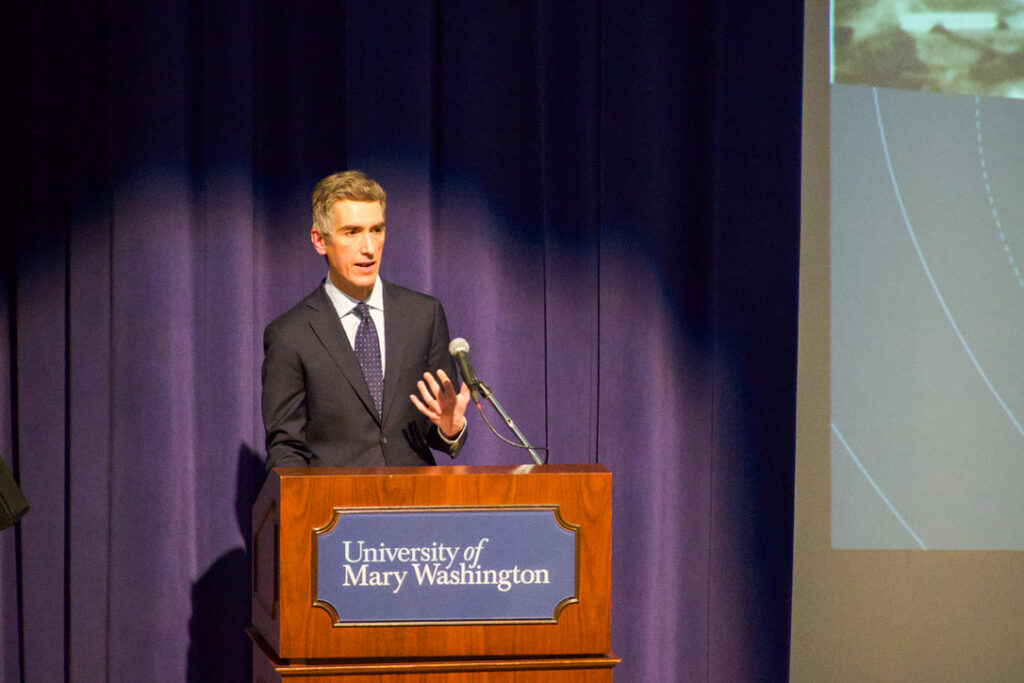Finding hope in crisis: The significance of polio on Franklin Delano Roosevelt’s presidency
4 min read
by GEOFFREY CARLISLE JR.
Staff Writer
“I always want to write a book that is a story that people want to keep reading,” said Jonathan Darman, a journalist and historian who spoke about Franklin Delano Roosevelt for UMW’s Great Lives Lecture Series on Feb. 15. He continued, “I was particularly drawn to FDR’s story because I thought it just felt very relevant today. How do we get through times when it seems like the country is falling apart and the world is spinning out of control?”
This was the question Darman wanted to answer in his new book, “Becoming FDR: The Personal Crisis that Made a President.”
During the lecture, Darman spoke about his new book that focuses on Roosevelt’s character and how his upbringing and battle with polio shaped who he was as president. Throughout the book, Darman also develops Roosevelt’s relationship with his mother Sara Ann Delano Roosevelt, his wife Eleanor Roosevelt and his political advisor Louis Howe.
According to Darman, he tried to think about the presidency from Roosevelt’s point of view during the writing process, which led him to consider the much-protected polio story as an essential aspect of Roosevelt’s ability to lead the country.
“A number of things really clued me in as I did my research,” said Darman. “One of them was looking at the differences between who FDR was before and after he had polio. If you look at who he was before polio, all the classic FDR traits that we think of weren’t present in him before he got polio.”
During the lecture, Darman theorized that Roosevelt would have never been president if he had not gotten polio, as his experience with the disease led him to be able to instill hope in the country when all seemed lost.
“I think it’s quite clear that he never would have been great,” said Darman. “He first needed to understand suffering by experiencing it in his own life.”
Roosevelt’s suffering struck in 1921 when he contracted polio at 39 years old. His disease presented him with two options: retire and return to his mother in the country, or push forward and run for president with the assistance of his friend and political advisor, Louis Howe.
While Roosevelt focused on his recovery, Howe kept Roosevelt’s name on people’s minds. Then, after his recovery, Roosevelt returned to politics, ran for governor and four years after that, ran for president. To Darman, this was the beginning of Roosevelt’s presidential character.
“For the first time, he is presented with something that is going to be a great challenge,” he said. “And FDR, in that moment, doesn’t look away.”
Roosevelt attended a resort at Warm Springs, Ga. during his recovery. After discovering the benefits of hydrotherapy, he purchased the once run-down natural hot spring and turned it into a fully staffed therapy center that helped other polio patients. According to Darman, it was here that Roosevelt developed a set of principles for how to nurture and foster hope.
Roosevelt’s mother, Sara Ann Delano Roosevelt, kept him under her close care through which he acquired “a strong sense of self and confidence, and this foundation of real, uncomplicated, unconditional love,” said Darman.
But these characteristics were not well-regarded by everyone, Darman explained; Roosevelt was bullied and disliked during his early educational years and through college for these very same traits that would make him fit to be president.
During his early years, Roosevelt was influenced by Theodore “Teddy” Roosevelt’s presidency—who was also his fifth cousin. As if he were following his cousin’s steps like a map, Roosevelt got married in 1905, became a New York state senator in 1910 and then Assistant Secretary of the Navy in 1913.
To Darman, Roosevelt’s principles are still relevant and applicable today in their ability to inspire leaders with hope.
“In times of crisis, how do we find hope, and how is a leader—how does a president help us to find hope?” he asked.
In response to his question, Darman referenced Roosevelt’s 1932 democratic nomination acceptance speech: “Out of every crisis, every tribulation, every disaster, mankind rises with some share of greater knowledge, of higher decency, or purpose.”
He reminded the audience that Roosevelt made that statement in the middle of the Great Depression, and people believed in him.
“They believed what he was saying because he believed it, and he believed it because he had lived it,” said Darman.
Darman left with a final message: “As we are evaluating people who come before us as someone who—years from now, someone could be up giving a speech talking about their great life and their great character. I think the way that we identify the seeds of that in people is to first ask them, ‘When was a moment in their life when they needed hope, and what did they learn from it?'” said Darman.
Reflecting on the lecture, Jenny Wolfe, a senior political science major said, “A deeper meaning, that we as students often get from books and lectures like this, is that even the giants throughout history are simply people. They are also individuals with flaws and illnesses, just like we are.”











